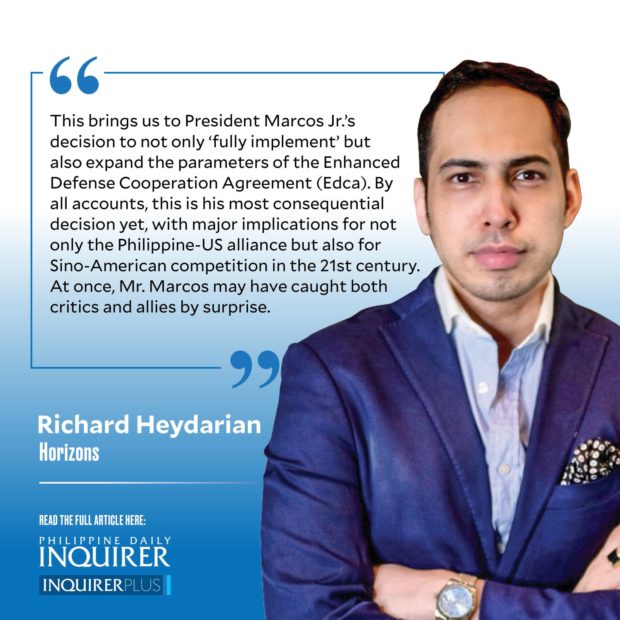Edca: Marcos Jr.’s game-changer move
 Madrid—Last month, I received an invitation from the Spanish embassy in Manila to present at this year’s Tribuna España-Filipinas (Spanish-Philippines Forum), an annual gathering that brings together top government and business officials from both nations.
Madrid—Last month, I received an invitation from the Spanish embassy in Manila to present at this year’s Tribuna España-Filipinas (Spanish-Philippines Forum), an annual gathering that brings together top government and business officials from both nations.
In particular, I was asked to join a panel to discuss how the two countries fit into, and can maximize cooperation, amid the seismic geopolitical shifts in the Indo-Pacific region. Among my co-panelists are no less than Emilio De Miguel Calabia, Spain’s ambassador at large for the Indo-Pacific, as well as our own Ambassador Jose de Vega, among the country’s most distinguished diplomats.
The timing of the event couldn’t be any better. On one hand, Spain has experienced a remarkable transformation in recent decades. Once liberated from self-imposed isolation and economic stagnation under its former caudillo, Gen. Francisco Franco, the southern European nation has gradually joined the ranks of the world’s most prosperous and democratic nations.
Things are not looking too bad for the Philippines either. Notwithstanding the dearth of inclusive development, the country now possesses one of the fastest-growing economies on earth. Despite our often-broken politics and heavily polarized democracy, global investors are giving the country a second look.
After decades of playing a relatively marginal role in regional affairs, the Philippines is now at the very center of an ongoing geopolitical scramble in the 21st century’s most vital, dynamic, and contested region. It’s not so much our geographical location, which made ours a prime real estate in the Cold War era, but more of our geopolitical positioning, which has placed the Philippines in an unprecedented strategic “sweet spot” amid the ongoing New Cold War.
And, dear reader, this brings us to President Marcos Jr.’s decision to not only “fully implement” but also expand the parameters of the Enhanced Defense Cooperation Agreement (Edca). By all accounts, this is his most consequential decision yet, with major implications for not only the Philippine-US alliance, but also for Sino-American competition in the 21st century.
At once, Mr. Marcos may have caught both critics and allies by surprise. After all, many in both opposition as well as pro-Duterte camps expected him to follow in the footsteps of former president Rodrigo Duterte. But as I have been explaining in these pages, and in a whole series of writings for publications around the world over the past seven months, Mr. Marcos is ending up more like his father rather than “Tatay Digong” in matters of grand strategy.
Just like the late Filipino caudillo, Mr. Marcos has reached out to all major powers under the banner of an “independent” foreign policy. But just like Marcos Sr., he is also solidifying the Philippines’ bilateral alliance with the US as his ultimate leverage.
After all, the Philippines fell into what I have described as China’s “pledge trap” under Duterte. Not only did Beijing fall short of implementing any significant infrastructure investments over the past decade, but it has also refused to offer any meaningful compromise in the West Philippine Sea.
During his much-vaunted trip to China last month, Mr. Marcos only managed to secure vague and generic promises of expanded cooperation. The $22.8 billion in pledges he took home may have been just a repacked version of what was offered (but largely unfulfilled) to Duterte six years earlier.
Alone, the Philippines has little leverage vis-à-vis China, though. Mr. Marcos’ big move on Edca, which would grant the Pentagon extensive access to key bases facing both the West Philippine Sea and Luzon Strait, has placed the Philippines at the center of the Pentagon’s “integrated deterrence” strategy against China. At once, the Philippines is vital to America’s efforts to constrain Beijing’s designs across both the South China Sea as well as on Taiwan.
Even more, the Philippines has increased its joint military exercises with the US from 300 last year to 500 this year, while the number of participating troops in the annual Balikatan joint exercises, which will take place in Ilocos Norte, is set to increase from around 8,000 to as many as 16,000.
For anyone who understands basic strategy, it’s very clear that the expansion of the bilateral alliance is meant not to provoke, but to instead prevent a conflict with China. Recent history clearly shows that weakness invites bullying, while preparation and strength prevent aggression. As the ancient Romans counseled, “If you want peace, prepare for war.”
rheydarian@inquirer.com.ph




















